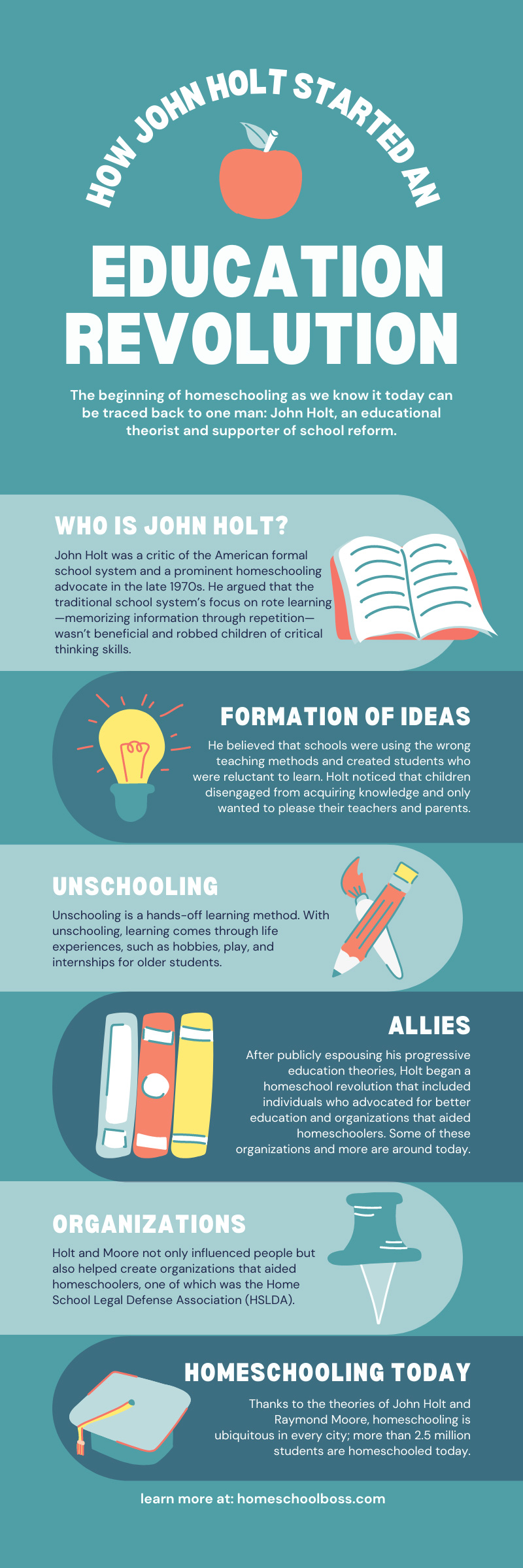The beginning of homeschooling as we know it today can be traced back to one man: John Holt, an educational theorist and supporter of school reform. After years of teaching in private schools, Holt began arguing for formal school reform in the 1960s. But after studying the writings of social critic Ivan Illich, Holt turned from formal school reformation to advocating for homeschooling.
Penning several books on the subject, Holt influenced other homeschool advocates, such as Raymond Moore, whose book Home Grown Kids quickly become popular and is still in use as a how-to book for homeschoolers to this day.
Learn more about how John Holt started an education revolution by being a pioneer in the homeschool movement and creating the first steps toward its continued success.
Who Is John Holt?
Born in 1925, John Holt was a critic of the American formal school system and a prominent homeschooling advocate in the late 1970s. Despite graduating from Yale with an engineering degree and teaching for elementary students for years, he became disillusioned with formal schooling.
He argued that the traditional school system’s focus on rote learning—memorizing information through repetition—wasn’t beneficial and robbed children of critical thinking skills. He believed children, even at a young age, should learn to gain knowledge rather than regurgitating information to pass exams.
Formation of Ideas
John Holt taught in the private school sector for several years in the 1950s. Unlike his coworkers, Holt did not have a teaching degree; some have thought that this informed his objective opinion on the school system.
He believed that schools were using the wrong teaching methods and created students who were reluctant to learn. They engaged in rote learning to avoid punishment and ridicule from educators instead of understanding and retaining a subject matter. Holt noticed that children disengaged from acquiring knowledge and only wanted to please their teachers and parents.
Unschooling
After teaching elementary school for years and recognizing that the formal school system wasn’t sustainable and was harmful to the development of young children, Holt knew that students deserved more from their education. He believed traditional schooling made students compliant rather than expressive and capable of critical thinking.
John Holt advocated for homeschooling but, more specifically, a teaching method called unschooling.
Unschooling is a hands-off learning method. With unschooling, learning comes through life experiences, such as hobbies, play, and internships for older students. Instead of a teacher dictating the curriculum, students participate in deciding subject matters; in fact, homeschool parents or teachers are more of a guide than an instructor.
John Holt’s newsletter, Growing Without Schooling, popularized unschooling. Many of Holt’s written works have helped to shape homeschooling today.
Holt’s Books
A prolific writer on reforming the American education system, Holt penned several books advocating for homeschooling. He also contributed to prominent magazines like Life and Redbook in the mid-60s when his theories became mainstream.
If you’re interested in learning about John Holt’s teachings, here is a breakdown of his early books that helped to shape homeschooling:
- How Children Fail (1964) — In his first book, Holt points out the ineffectiveness of formal schooling and how it robs students’ ability to learn. Instead, students are eager to seek praise for finding the correct answer rather than learning to gain knowledge.
- How Children Learn (1967) — Holt emphasizes the benefits of homeschooling as opposed to formal schooling.
- The Underachieving School (1969) — In this book, he focuses on the belief that schools aren’t working.
- What Do I Do Monday (1970) — He espouses ideas about how schools could be better.
- Freedom and Beyond (1972) — Holt questions what educators mean when they say children should have more freedom in the classroom.
- Escape From Childhood (1974) — Holt asserts that children should have the right to fair and equal treatment, including working for pay and voting.
Regardless of his popularity, Holt’s progressive theories and unwillingness to accept formal schooling methods compromised his teaching career. Several schools let him go after he refused to teach their appointed curriculums and, instead, attempted his own teaching methods.
Allies
After publicly espousing his progressive education theories, Holt began a homeschool revolution that included individuals who advocated for better education and organizations that aided homeschoolers. Some of these organizations and more are around today.
Holt wasn’t alone in helping to create the homeschool resources that are available today. Raymond Moore, his friend and a fellow educator, also agreed with his stance on formal schooling.
Moore argued that schooling had damaging effects on young children. Specifically, he thought that children should be taught at home until ages eight or nine to give them a solid foundation to build their academic skills and allow them to form their own moral and emotional beliefs.
In 1981, Moore wrote Home Grown Kids expanding on this idea, and it quickly became popular; in fact, it is still the first book many homeschool parents read today.
Organizations
Holt and Moore not only influenced people but also helped create organizations that aided homeschoolers, one of which was the Home School Legal Defense Association (HSLDA).
Even though homeschooling was legal in all 50 states when Holt and Moore began advocating, several states had restrictive regulations. In some, parents had to submit their curriculums and plans to school boards.
Even though the overwhelming majority of school boards were cooperative, some weren’t, so mediation and, in some cases, legal aid was necessary to support parents.
In the early 1980s, working with school boards to homeschool their children was tenuous for some parents due to a struggle between evangelical and secular viewpoints. Other organizations, along with HSLDA, spoke on behalf of homeschool families to change state laws.
Today, while some states have more stringent requirements than others, homeschooling laws are more relaxed and allow parents to teach their children using whichever learning method they choose.
Homeschooling Today
Thanks to the theories of John Holt and Raymond Moore, homeschooling is ubiquitous in every city; more than 2.5 million students are homeschooled today. They all have the opportunity to reap the benefits of homeschooling, which include:
- Flexibility in subject matters, learning methods, and schedules.
- A pace that suits their needs.
- Time for interests that formal schooling excludes.
- Accommodations for a family’s certain circumstances, like demanding work schedules, illness of a family member, or a military family’s traveling.
Learning how John Holt started an education revolution can help you understand the history of homeschooling and the many benefits of a learning environment at home. You can learn more about homeschooling, including online homeschool testing, from Homeschool Boss!


Pingback: The Pros and Cons of Homeschooling | Test Prep Score
Comments are closed.